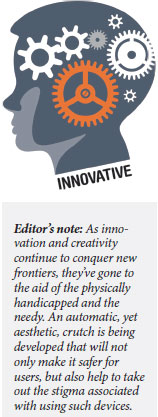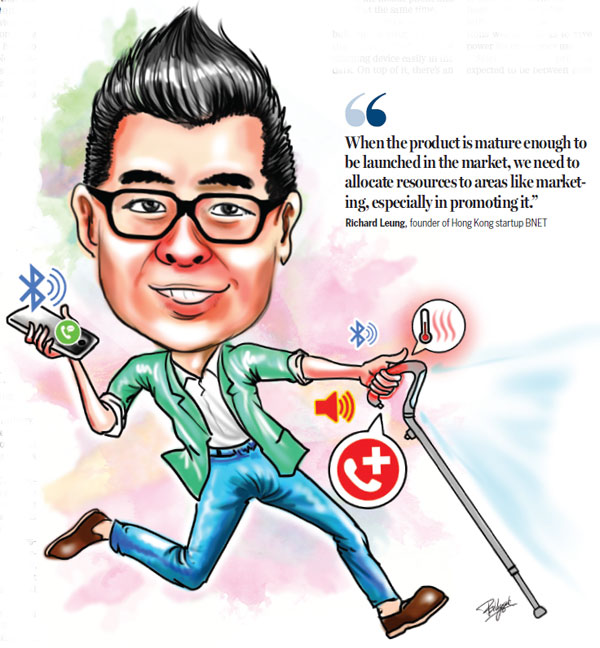Walking tall at the touch of a button
Updated: 2017-09-01 06:43
By China daily(HK Edition)
|
|||||||
Richard Leung couldn't bear the pain of seeing other people having to go through the ordeal his sister did.
Cancer had deprived his sister of her ability to walk, but her ironclad will aggravated the agony. She had refused to use a crutch up to the day she breathed her last because she would not allow herself to be seen as weakly and debilitated.
Leung, who founded Hong Kong startup BNET, says her sister's torment had very much given him the inspiration to embark on a mission to redefine the functions of a crutch that will not be viewed negatively by the public, while deterring users from shunning it.
His product, StickU, is an intelligent, aesthetic crutch that offers both practicality and increased functions. With a power button installed in the handle, it's easier to use - just grab it and it automatically goes into service.

There're also several sensors attached to the device, providing various degrees of illumination that will flash from the front torch according to the lighting conditions of the environment, while the heater surface on the handle operates automatically with the thermal sensor.
It's worth noting that the hidden power button and the sensor-driven device help overcome the aversion some elderly people may have to electronic gadgets. No training is needed for using the walking stick which is geared to moulding into their lives smoothly.
The crutch has only one button, which is designed for emergency use. Once it's pressed, the sound-emitting device releases an alarm, with the front torch transmitting a light to draw attention. Moreover, for smartphone users, a distress message can be sent to targeted parties using bluetooth technology.
Bluetooth technology has replaced the traditional use of the SIM card to preserve the privacy of users.
"We had interviewed some elderly people. The most important reason for them not willing to use advanced electronic devices is that they feel they're being monitored," says Leung.
"Bluetooth technology allows users to choose whether they're willing to reveal their location through apps on their smartphones."
According to BNET director Brian Lam, there's also a notification light alerting users to whether the GPS is turned on or otherwise.
Bluetooth technology presents a smaller financial burden for users. Furthermore, unlike the SIM card, it's not hindered by geographical constraints.
The most brilliant function of StickU is that the emergency mode can also be triggered if a user falls to the ground.
"The chances of elderly people accidentally falling to the ground are high," says Lam. "If fall victims fail to seek medical treatment on time, the risk of death increases."
"We're looking for some tough but light material for the crutch. It's important to strike a balance here to ensure that the cost wouldn't be that high," explains Leung.
The charging device for the StickU is user-friendly as well. By simply placing it near the charger, it'll be connected to each other through the magnetic device. The charger can charge the mobile phone and StickU at the same time.
There's also a mild light bulb on the charger to help the elderly look for the charging device easily in the dark. On top of it, there's an anti-loss scheme. The mechanism would remind the users if they unwittingly leave their mobile phones or StickU behind.
Once the StickU is fully charged, it can be used for two to three days. However, if the battery drops to below a certain level, some of the functions will stop so as to save power for emergency use.
StickU's launch price is expected to be between $199 and $399.
"Perhaps, with a larger number of users, the cost could be mitigated with mass production," says Lam. "The highest estimation only accounts for the use of the most expensive material. It may not be our final decision. We don't want to give the public false hope."
BNET is aware that affordability may present a problem for some elderly people. "The huge investment on testing and certification justifies the price," he says.
"We welcome public and private investors and hope the government could provide financial resources like an angel fund to our company."
BNET is considering introducing a cheaper version to cater to people in need of financial aid.
"As a start-up company, we're focusing on product development. When the product is mature enough to be launched in the market, we need to allocate resources to areas like marketing, especially in promoting it," says Leung.
"The major challenge in the development process is how to prevent false alarms being raised. This would greatly minimize the inconvenience of contacting people and prevent them from ignoring the message if an accident really occurs."
The company sees getting the targeted group of users to accept the product as its biggest challenge.
For the short term, BNET hopes StickU can successfully enter the market and take the lead in the aging products industry, as well becoming a significant brand in Hong Kong.
In the long term, it aims to acquire more data, experience and technology, develop the product for other uses and expand the company's product line.

(HK Edition 09/01/2017 page7)